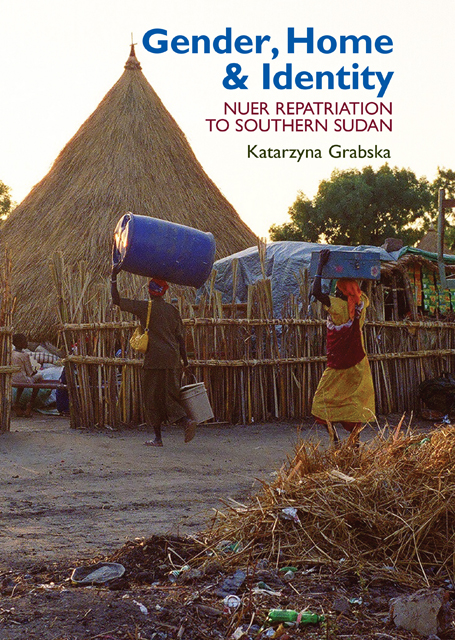Book contents
- Frontmatter
- Contents
- List of Maps and Photographs
- Preface
- Acknowledgements
- Glossary of Nuer Terms
- Acronyms
- 1 Returnee Dilemmas: Dangerous Trousers and Threatening Mini-skirts
- 2 Jiom – Season of Fighting and Running: Conflict, Mobility, Gender
- 3 Mai – Season of Displacement: Becoming ‘Modern’ in Kakuma
- 4 Rwil – Season of ‘Returns’
- 5 Season of Settling-in: Land and Livelihoods
- 6 Tot – Gendered Emplacement Identities, Ideologies and Marriage
- 7 Returnees as Visitors and the Nuer Community: Where Do We Go From Here?
- Epilogue
- Bibliography
- Index
- Eastern African Studies
- Frontmatter
- Contents
- List of Maps and Photographs
- Preface
- Acknowledgements
- Glossary of Nuer Terms
- Acronyms
- 1 Returnee Dilemmas: Dangerous Trousers and Threatening Mini-skirts
- 2 Jiom – Season of Fighting and Running: Conflict, Mobility, Gender
- 3 Mai – Season of Displacement: Becoming ‘Modern’ in Kakuma
- 4 Rwil – Season of ‘Returns’
- 5 Season of Settling-in: Land and Livelihoods
- 6 Tot – Gendered Emplacement Identities, Ideologies and Marriage
- 7 Returnees as Visitors and the Nuer Community: Where Do We Go From Here?
- Epilogue
- Bibliography
- Index
- Eastern African Studies
Summary
On 15 December 2013, fighting broke out between the pro-government forces aligned with President Silva Kiir and opposition groups associated with the former Vice-President, Riek Machar. There are competing narratives about the events of the new conflict. Many commentators dubbed the violence as ethnically motivated, between Dinka and Nuer groups. Yet, this explanation skims over the deeper tensions and the more fragile and complex alliances that emerged as a result of the December crisis. The violence spread from Juba to Unity and Jongolei, and further to Equatoria. At first, Bentiu, Lɛr and Malakal were strongholds of the anti-government forces. However, government forces slowly but surely reclaimed these areas. As a result, Bentiu and Lɛr were razed by both retreating rebels and advancing government forces. By the beginning of February 2014, the United Nations estimated that over 740,000 people had been displaced, with large numbers seeking protection in UNMIS bases. Around 131,000 refugees had crossed into Ethiopia, Kenya, Sudan and Uganda.
The violence that was unleashed came as a shock. As Jok Madut Jok, a founder of the Sudd Institute, argued during a meeting of representatives of South Sudanese civil society in Nairobi held on 10 January 2014, the abruptness of events, how suddenly they erupted, and without warning, was a great surprise. What was also shocking was the speed at which the violence spread, not just from barracks to barracks but from state to state. The viciousness was also a shock, as was the ethnic tone that it rapidly acquired, having previously been contained as an internal military issue.
Yet, as Jok and others at the meeting argued, the events of 15 December were not unexpected for anyone who has been paying attention to South Sudan over the last eight years. Abuse, human rights violations and crimes have long gone unpunished; so far no one has been held accountable in South Sudan. This, as many South Sudanese activists argue, needs to be addressed if peace negotiations are to find a resolution.
The history of this violence goes back to the legacy of South Sudan’s independence and liberation wars, where factionalism and division had left deep social frictions.
- Type
- Chapter
- Information
- Gender, Home and IdentityNuer Repatriation to Southern Sudan, pp. 203 - 205Publisher: Boydell & BrewerPrint publication year: 2014



